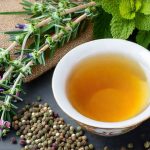Bladder discomfort can significantly impact quality of life, ranging from mild urgency to more severe pain and frequency. Many factors contribute to bladder issues, including infections, dietary choices, stress, and underlying medical conditions. While professional medical evaluation is always the first step when experiencing persistent or concerning symptoms, incorporating certain herbal teas into a wellness routine may offer gentle support for bladder health, alongside appropriate medical care. It’s crucial to understand that tea isn’t a cure-all, but rather a potential complementary approach to managing discomfort and promoting overall well-being. This article will explore some of the most promising teas traditionally used – and increasingly researched – for soothing the bladder, focusing on their properties and how they might offer relief.
The world of herbal teas is vast, offering a diverse range of flavors and potential benefits. When considering teas for bladder health, it’s vital to approach them with informed caution. Some herbs can interact with medications or exacerbate existing conditions, so consulting with a healthcare professional before adding new teas to your routine is essential. Furthermore, the quality of herbal tea matters significantly; sourcing from reputable suppliers ensures purity and potency. We will focus on options that have historically been used for urinary tract support and are generally considered safe for most individuals when consumed in moderation – but again, individual sensitivities should always be taken into account. If you’re concerned about finding appropriate care, consider looking at best hospitals for treatment options.
Soothing Herbal Allies: Teas for Bladder Support
Several teas stand out as potential allies for bladder health due to their specific properties. These aren’t replacements for medical treatment, but rather tools that may help manage symptoms and promote comfort when used responsibly. Cornsilk tea, derived from the silky strands of corn ears, has a long history in traditional medicine as a diuretic and anti-inflammatory agent. Its mild flavor makes it easily palatable, and its gentle nature suggests minimal side effects for most people. Another excellent option is parsley tea, which, like cornsilk, acts as a natural diuretic, helping to flush out the urinary tract and potentially reduce irritation. Finally, dandelion root tea, also known for its diuretic properties, supports kidney function, which indirectly benefits bladder health by promoting efficient fluid balance. Managing medications long-term can be complicated, so exploring long-term medication review is important.
These teas operate on different principles but converge on the idea of supporting the body’s natural processes to alleviate bladder discomfort. Diuretics help increase urine production, effectively flushing out irritants and reducing concentration in the bladder. Anti-inflammatory agents can soothe inflamed tissues, lessening pain and urgency. It’s important to note that excessive diuretic intake could potentially lead to dehydration, so maintaining adequate hydration throughout the day is crucial when incorporating these teas into your routine. The key lies in balance – using tea as a complementary tool rather than relying on it solely for symptom management.
The gentle nature of these herbal options distinguishes them from more potent diuretics or medications. They offer a subtle approach that may be better tolerated by individuals sensitive to stronger substances. However, even with mild herbs, observing your body’s response and adjusting consumption accordingly is vital. Start with smaller amounts and gradually increase if well-tolerated, always paying attention to any changes in symptoms or side effects. Remember the focus should be on supportive care alongside medical guidance.
Exploring Specific Teas & Their Benefits
Cornsilk tea’s benefits are often attributed to its compounds that promote diuresis without depleting electrolytes like some pharmaceutical diuretics. This makes it a gentler option for promoting urinary flow and potentially reducing bladder irritation. – It’s traditionally used to address mild incontinence and frequent urination. – Research, though limited, suggests potential anti-inflammatory properties which could further contribute to bladder comfort. Preparing cornsilk tea involves steeping about 1-2 teaspoons of dried cornsilk in a cup of hot water for 5-10 minutes. It has a very subtle, slightly sweet flavor and can be enjoyed plain or with a touch of honey.
Parsley tea’s diuretic action is due to compounds like apigenin and luteolin, which have been shown to increase urine production and reduce fluid retention. This flushing effect can help prevent the buildup of irritants in the bladder and may alleviate discomfort associated with urinary tract infections (UTIs) – although parsley tea should not be used as a substitute for antibiotic treatment if a UTI is present. – Parsley also contains vitamins K, C, and A, contributing to overall health and well-being. To make parsley tea, use about 1-2 teaspoons of fresh or dried parsley leaves per cup of hot water, steeping for 5-7 minutes. Be mindful that excessive consumption of parsley may not be suitable for individuals on blood thinners due to its vitamin K content.
Dandelion root tea differs from the other two by focusing more directly on kidney function. Healthy kidneys are crucial for maintaining proper fluid balance and filtering waste products, which indirectly supports bladder health. – Dandelion root acts as a gentle diuretic while also providing nutrients like potassium, known for its role in electrolyte balance. – Its potential benefits extend beyond bladder support, including liver detoxification and digestive aid. Preparing dandelion root tea involves steeping 1-2 teaspoons of dried roasted dandelion root in hot water for 7-10 minutes. It has a slightly earthy flavor that some find enjoyable, while others may prefer to add lemon or honey to enhance the taste. Understanding uroflowmetry setup can help with diagnostics as well.
Important Considerations & Precautions
While these teas offer potential benefits, it’s crucial to be aware of certain precautions. – Pregnancy and breastfeeding: Certain herbs are not safe during pregnancy or lactation, so consult your healthcare provider before consuming any herbal tea if you are pregnant or nursing. – Medication interactions: Some herbs can interact with medications, potentially altering their effectiveness or causing adverse side effects. Always discuss potential interactions with your doctor or pharmacist. – Allergies: Be mindful of potential allergies to specific herbs. Start with a small amount and monitor for any allergic reactions like skin rash, itching, or difficulty breathing.
Hydration remains paramount when incorporating these teas into your routine. Diuretics increase urine production, so it’s essential to drink plenty of water throughout the day to prevent dehydration. Aim for at least 8 glasses of water daily, and adjust based on your activity level and climate. – Pay attention to your body’s signals and reduce or discontinue tea consumption if you experience any adverse effects. – Quality matters: Source teas from reputable suppliers who ensure purity and potency. If experiencing pain after surgery, consider post-surgical bladder pain medication options.
Finally, remember that these teas are complementary tools and should not be used as a substitute for professional medical care. If you are experiencing persistent bladder problems, consult with a healthcare provider to determine the underlying cause and receive appropriate treatment. Self-treating can delay diagnosis and potentially worsen your condition. Herbal teas can offer gentle support and comfort alongside conventional medical care, but they are not a replacement for it.





















